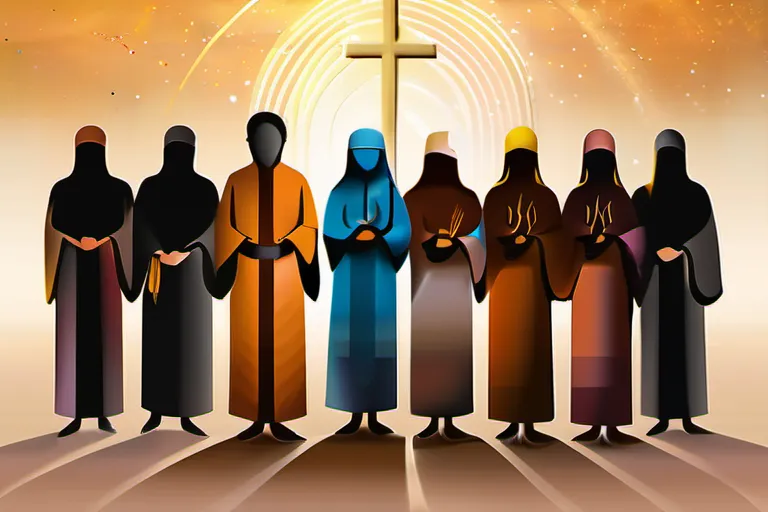Explore the key ideas and beliefs associated with unaffiliated religion, including secular humanism, atheism, agnosticism, and more.
Unaffiliated religion refers to individuals who do not identify with any organized religious group. This article delves into the main concepts associated with unaffiliated religion, providing a comprehensive understanding of this growing demographic.
The Rise of Unaffiliated Religion
The rise of unaffiliated religion has been like a ripple spreading across a calm lake, reflecting societal shifts and personal quests for meaning in profound ways. Have you ever wondered why more people are choosing to eschew traditional religious affiliations? This trend isn’t just a passing fad; it’s deeply rooted in historical context.
One can trace the origins of unaffiliated religion back to the Enlightenment, where thinkers like Voltaire and Diderot began questioning established religious dogmas. But the real surge came with the Industrial Revolution, which disrupted traditional ways of life and forced individuals to reevaluate their beliefs in a rapidly changing world.
Demographic Trends
- The rise is particularly evident among younger generations who are increasingly secular, perhaps due to exposure to diverse ideas through technology. Are these young people rejecting religion entirely, or are they finding new ways to make sense of the world?
- In many Western countries, the percentage of individuals identifying as unaffiliated has steadily increased over the past few decades. Could this be a sign that society is becoming more open-minded and less dogmatic in its approach to spirituality?
It’s fascinating to see how technology and global interconnectedness have played significant roles in shaping these trends. For instance, social media platforms provide a space for people to share their personal beliefs without the pressure of belonging to an organized religion. This phenomenon raises questions about the future of traditional religious institutions.
As we continue to explore this topic, it’s crucial to understand that unaffiliated religion isn’t just about not believing; it’s about actively seeking a framework for understanding life, ethics, and existence. The journey towards finding one’s own path is both challenging and liberating, much like navigating the open sea without charts.
Defining Unaffiliated Religion
When we talk about unaffiliated religion, it’s like peeling back layers to uncover the essence of belief—layers that are often overlooked in more traditional religious contexts. Defining this concept isn’t as straightforward as one might think; it’s a dynamic and evolving landscape shaped by various beliefs and ideologies.
For starters, secular humanism is like a beacon guiding individuals who value human reason, ethics, and scientific inquiry over supernatural explanations. Imagine a world where the focus shifts from divine commandments to personal responsibility and empathy towards others; that’s what secular humanists strive for.
Atheism, on the other hand, can be seen as a stance against the belief in any deity or gods. It’s like challenging a deeply rooted assumption, much like questioning why the sky is blue without considering an underlying supernatural force. Atheists often prioritize evidence and rationality over religious doctrines.
Agnosticism introduces another layer of complexity. Here, individuals are unsure about the existence or non-existence of deities. It’s akin to standing at a crossroads where you can neither confirm nor deny something—a middle ground between certainty and uncertainty.
Other notable mentions include freethought, which encourages the rejection of superstition in favor of evidence-based reasoning, and agnostic humanism, which combines agnosticism with a focus on human welfare and well-being. These ideologies often intertwine, reflecting a broader skepticism towards traditional religious claims.
The beauty of unaffiliated religion lies in its flexibility and adaptability. It allows individuals to construct their own spiritual or philosophical frameworks based on what makes sense to them personally. Whether it’s through the lens of rationality, ethics, or personal growth, these beliefs offer a diverse array of perspectives that challenge us to rethink our assumptions about spirituality.
Understanding these various definitions and characteristics is crucial for anyone looking to explore this multifaceted realm. Each belief system has its unique strengths and challenges, contributing to a rich tapestry of human thought and experience.
The Beliefs and Practices of Unaffiliated Religion
When we delve into the beliefs and practices of those who identify as unaffiliated, it’s like exploring a vast, ever-expanding library where each shelf represents a unique worldview. Atheism, for instance, is often seen as the rejection of a traditional deity or deities. But what does this mean in practice? Is it simply about not believing in gods, or is there more to it?
Secular humanism takes a different approach by focusing on human values and ethics without reliance on any supernatural beliefs. It emphasizes reason, science, and the inherent worth of every individual. How does this philosophy shape one’s daily life and decisions? Do those who embrace secular humanism face unique challenges or benefits in their communities?
Agnosticism is another complex concept that bridges atheism and religion by questioning the existence of a higher power. It’s like standing at the edge of an unknown canyon, unsure if there’s anything on the other side but willing to explore further. How does agnosticism influence one’s approach to morality and spirituality?
These beliefs often manifest in specific practices or actions that reflect their values. For example, volunteer work might be a common practice among those who prioritize human welfare. Similarly, engaging in critical discussions about societal issues can be seen as a way to uphold the value of reason and evidence-based thinking.
The journey through unaffiliated religion isn’t just about belief or disbelief; it’s about finding meaning and purpose in a world that often lacks clear answers. How do these individuals navigate their personal beliefs while interacting with communities that hold different views? The answer might lie in open dialogue, empathy, and a willingness to question one’s own assumptions.
The Role of Reason in Unaffiliated Religion
The Role of Reason in Unaffiliated Religion: Investigating the Importance of Critical Thinking and Rationality
Have you ever pondered how we make sense of the world without relying on a structured religious framework? For those who identify as unaffiliated, reason and critical thinking are the pillars upon which their worldview stands. These individuals believe that by using logic and evidence, they can navigate through life’s complexities with clarity and purpose.
Imagine reason as a lighthouse in a vast, dark ocean of uncertainty. It guides unaffiliated individuals toward clearer waters, illuminating the path ahead and helping them avoid the rocky shores of superstition and irrational beliefs. In their journey, these thinkers often employ evidence-based approaches to answer life’s profound questions, questioning every assertion with a critical eye.
Atheism, for instance, is not just about denying the existence of gods; it’s an embrace of logic and empirical evidence. Similarly, agnosticism acknowledges that we may never know everything, yet still seeks to understand through rational inquiry rather than faith or dogma.
Unaffiliated religionists often engage in scientific methods and philosophical debates to explore ethical dilemmas, societal issues, and existential questions. They might ask: How do we define morality without religious doctrine? Can science provide answers that are as compelling as those found in holy texts?
Critical thinking also plays a crucial role in shaping the values and principles of unaffiliated individuals. By questioning traditional norms and challenging established beliefs, they can forge their own paths and contribute to societal progress.
The Social and Cultural Implications of Unaffiliated Religion
The social and cultural implications of unaffiliated religion, such as secular humanism, atheism, and agnosticism, are profound and multifaceted. These beliefs often challenge traditional religious norms, leading to a complex interplay between individual identity and societal expectations. How does one navigate the waters of being unaffiliated in a world saturated with religious symbols and practices? Is it possible to build a meaningful community without relying on shared faith?
In exploring these questions, we find that unaffiliated religion offers unique perspectives on social and cultural issues. For instance, secular humanists often advocate for ethical living based on reason and science rather than religious doctrine. This can lead to a more inclusive approach to morality, where individuals from different backgrounds come together under shared principles of justice and empathy.
- Identity: Unaffiliated religion challenges traditional notions of identity. How do you define yourself when your beliefs don’t align with those prescribed by society or religious institutions?
- Community**: Building a sense of belonging in the absence of a shared faith can be challenging but rewarding. Activists and community leaders within unaffiliated circles often find strength through common values like human rights and environmental conservation.
- Activism**: Unaffiliated individuals frequently engage in social justice movements, driven by their commitment to ethical living and societal improvement. This activism serves as a powerful form of expression for those who seek to change the world through rational means rather than divine intervention.
The political implications are equally significant. As unaffiliated religion grows, so does its influence on policy debates around secularism, free speech, and individual rights. These discussions often center on how to balance respect for diverse beliefs while ensuring that no single religious viewpoint dominates public life.
Ultimately, the social and cultural landscape of unaffiliated religion is a rich tapestry of personal belief systems coming together to shape the future. It’s a journey marked by both challenges and opportunities—challenges in finding a sense of belonging, and opportunities in fostering a more rational and compassionate society.
The Future of Unaffiliated Religion
As we journey into the future of unaffiliated religion, one might wonder if these diverse beliefs and practices will continue to grow in significance. Will the lines between faith and reason become even more blurred, or will they solidify into distinct paths? The trend seems to point towards a world where personal spirituality remains an individual choice rather than a communal mandate.
Consider how technology might play a pivotal role in shaping these unaffiliated beliefs. Virtual communities could emerge as powerful platforms for sharing and exploring ideas, potentially fostering a sense of global community among individuals who identify with non-traditional religious concepts like secular humanism or atheism. Imagine if the internet allowed people to find kindred spirits across continents, forming networks that challenge geographical barriers.
However, the future is not without its challenges. As unaffiliated religions expand, they must navigate issues of identity and community just as traditional faiths do. Will these beliefs become more structured over time, or will they remain fluid and adaptable? The diversity within the unaffiliated community suggests that there may be a spectrum of approaches to organizing and expressing one’s spirituality.
One might also ponder the role of education in this evolving landscape. As schools and universities begin to recognize the increasing numbers of students who identify as unaffiliated, will they develop curricula that respect and integrate these perspectives? How can we ensure that future generations understand the complexities of belief without imposing a single viewpoint?
The path ahead for unaffiliated religion is both exciting and uncertain. It’s akin to charting a new map, where each individual belief system contributes unique coordinates to our global spiritual compass. As we move forward, it will be crucial to support these diverse voices while acknowledging the shared humanity that connects us all.
Conclusion
 By the end of this article, you will have gained valuable insights into the beliefs and practices of those who identify as unaffiliated, as well as an appreciation for the diversity within this group.
By the end of this article, you will have gained valuable insights into the beliefs and practices of those who identify as unaffiliated, as well as an appreciation for the diversity within this group.











